UK vaccine gambles paid off, while EU caution slowed it down
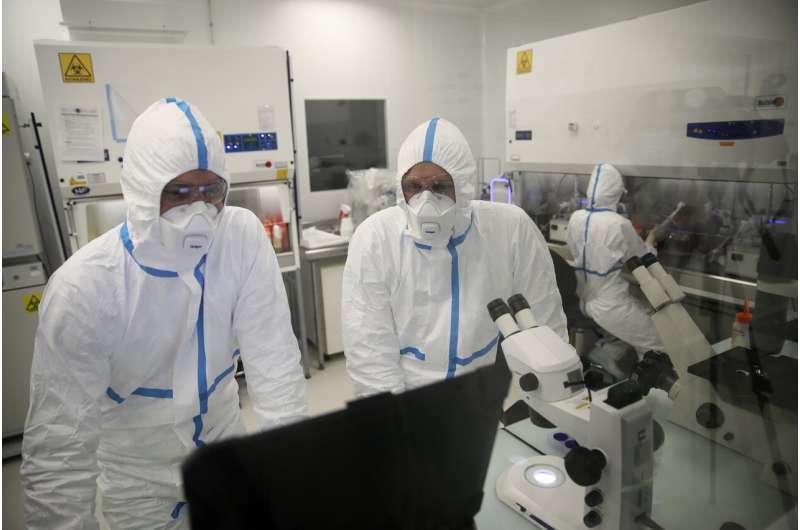
French pharmaceutical startup Valneva had big news in September: a government contract for 60 million doses of its coronavirus vaccine candidate.
The buyer? The United Kingdom—not the European Union, as might be expected for a company on the banks of the Loire.
"What a true waste," bristled Christelle Morancais, president of the Pays de la Loire regional council, as she tried to wrap her head around the missed opportunity. The British, she told The Associated Press, "rolled out the red carpet for this company, helping with financing and the set-up. ... And we were powerless."
The U.K. has now ordered another 40 million doses and has options for more from Valneva, which has a plant in Scotland. The EU is still in talks with the company.
That pattern of Britain investing aggressively and early while the EU takes a slower, more cautious approach has been the hallmark of the vaccine race in Europe—and offers a window into problems that have dogged the vaccination rollout by the world's biggest trading bloc.
As with other countries that moved quickly, negotiating contracts earlier has helped Britain avoid some of the vaccine supply problems the 27-nation EU has faced—as when AstraZeneca said it hit a production issue. Valneva President Franck Grimaud told the AP that Britain will receive vaccine doses earlier because it signed first.
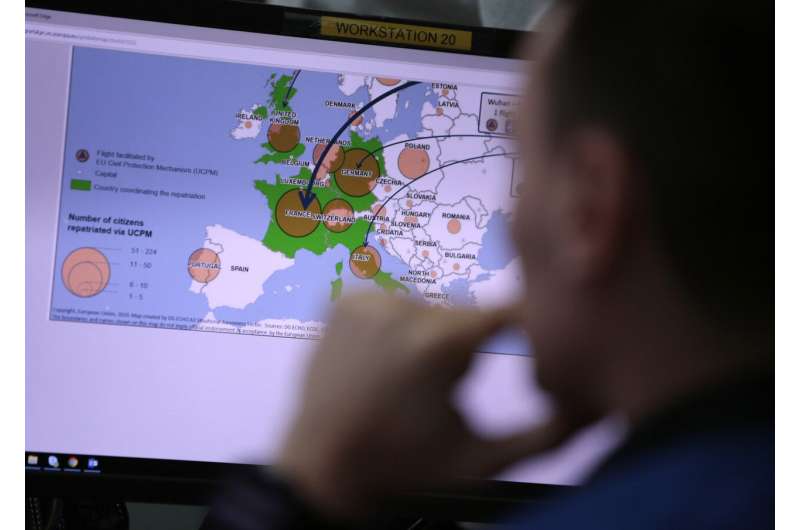
But the U.K. has also shown speed and agility in other areas: Its regulatory agency has authorized vaccines more quickly than the EU's, and its government has experimented with stretching out the time between shots—allowing it to roll out first doses faster so more people can have some protection quickly.
The EU has been more cautious on both counts. While bloc is still getting and distributing vaccine—unlike much of the world—it has so far been left in the U.K.'s rearview mirror. Britain has given at least one shot to about 15% of its population, compared to some 3% in the bloc. This is not only a matter of pride: The EU has already lost more than 490,000 out of its 450 million people to the pandemic, according to Johns Hopkins University, and uncounted others who were not tested before they died.
Diane Wanten, from Alken, Belgium, survived a bout with COVID-19 that put her in intensive care last spring. The 62-year-old now badly hopes for shots for herself and her husband Francesco, who has Parkinson's. "If there is a vaccine for me tomorrow, I'll be in line," she said.
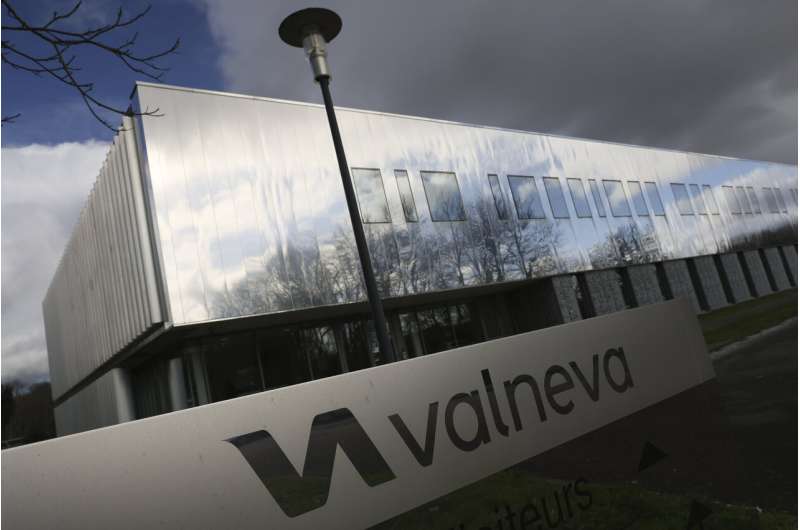
Instead, "it is Britain which is towering head and shoulders above the rest," Wanten said. "I keep asking myself why things are possible there and not here in Belgium?"
Britain has its own struggles: a death toll of 112,000 in a country of 67 million and plenty who say the Conservative government should have moved faster to fight the virus. Still, it celebrated the Valneva contract as validation of its vaccine strategy—and its decision to leave the EU.
"We've backed many horses—no matter where they're from," Health Secretary Matt Hancock said. "It's a great example of what we can achieve together, working as one United Kingdom."
At the same time, EU Commission President Ursula von der Leyen was at the European Parliament, answering questions about how things could have gone so wrong in a drive that was supposed to showcase how the EU makes its 27 members stronger.
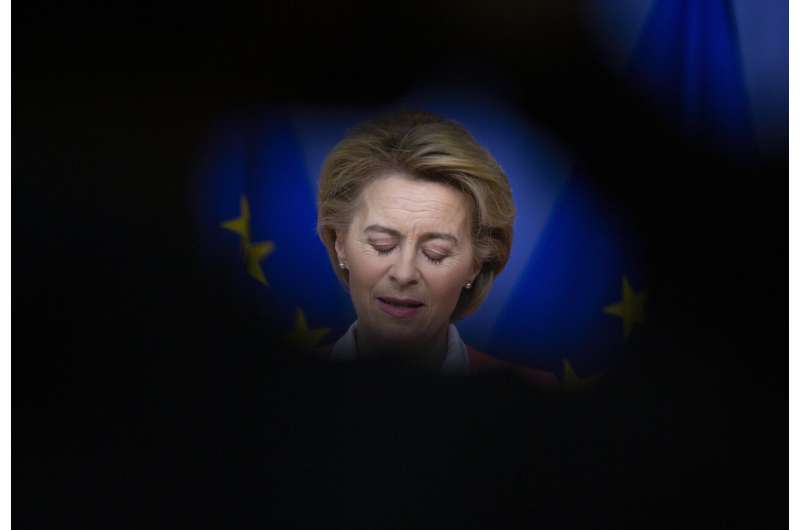
She admitted EU errors—specifically a threat, eventually retracted, of border checks on vaccines from EU member Ireland to Northern Ireland, which is part of the U.K. But she was steadfast that the bloc's deliberate drive would prove successful.
"I see this as a marathon in which we just finished the first few kilometers," she said.
But in Marseille, France, the head of the intensive care ward at La Timone Hospital fears the EU stumbled at the starting line.
"There was a clear lack of anticipation. Then a lack of doses. Then we didn't vaccinate the right people," said Dr. Julien Carvelli.
When the virus took hold of the continent a year ago and the race for a vaccine began, the EU trumpeted its size as an asset in vaccine negotiations. The bloc did get competitive prices, but that took time—and the difference of a few months has cost it.
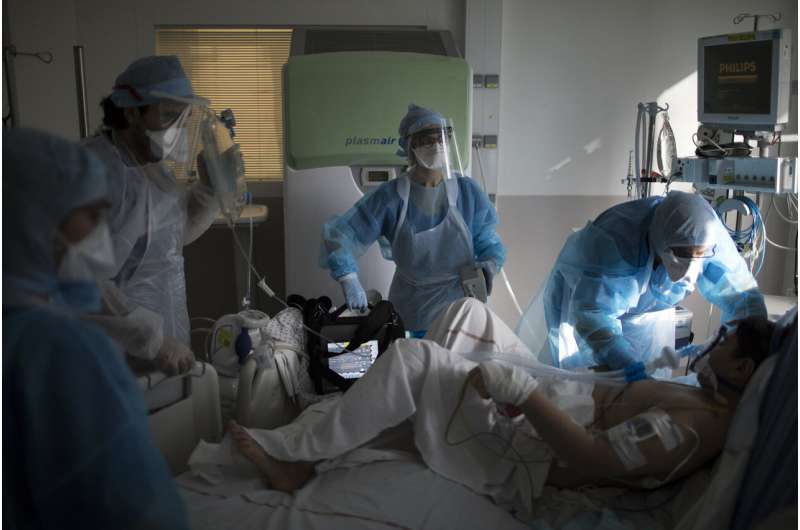
When the EU had a major row with AstraZeneca last month over the company's announcement it would only be able to deliver 31 million doses of a promised first batch of 80 million, CEO Pascal Soriot pointed out that "the U.K. contract was signed three months before the European vaccine deal. So with the U.K. we have had an extra three months to fix all the glitches."
Luck has also played a role. Many vaccine deals were signed before anyone knew which shots would even work or be produced first. The EU signed a contract with Germany-based CureVac in November while the U.K. just inked a deal a few days ago—but, so far, that hasn't mattered since the company is still testing its vaccine.
The EU was also slower to approve vaccines, opting for a longer process that gave the shots fuller scrutiny from the European Medicines Agency, rather than emergency authorization, to ensure greater public confidence, a decision it still defends.
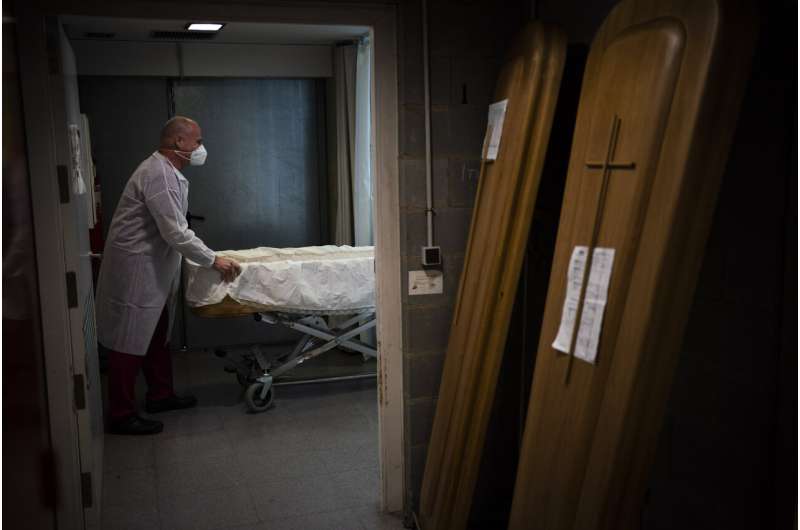
As a result, Britain started giving out vaccine shots on Dec. 8 while the EU did not get going until Dec. 27. It has not caught up since.
France's Europe Minister Clement Beaune has said "Britain has taken enormous risks."
If that's true, it's paid off. Britain's health chief last week hailed a new study suggesting that a single dose of the AstraZeneca vaccine offers strong protection for 12 weeks against the virus, saying that supports the government's much-debated strategy of delaying the second shot.
Compare that with France, which flirted with extending the time between doses but decided not to. Other EU countries have sometimes held back doses to make absolutely sure a person could get a second shot at a specific time, thus denying a first shot for others.
Several EU nations have also proven even more risk-averse than the cautious EMA, which approved the AstraZeneca vaccine for use in the EU for all adults, despite some questions about whether there was enough data on its impact on the elderly.
-
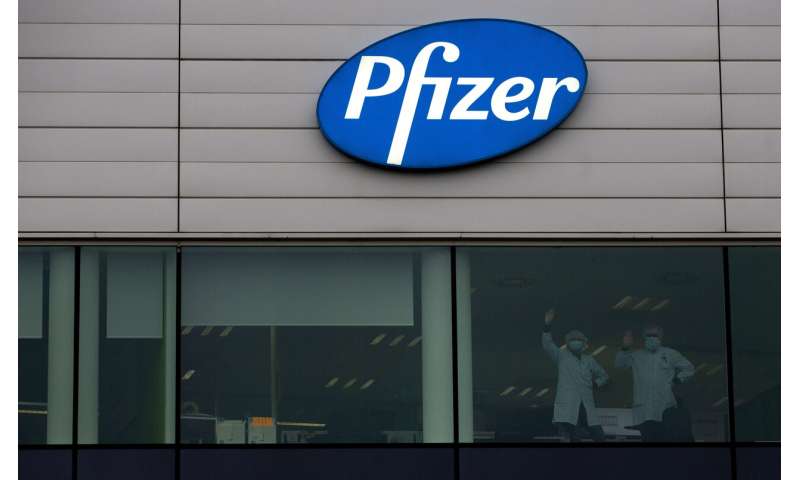
In this Wednesday, Dec. 2, 2020 file photo, two employees wave from a window at Pfizer Manufacturing in Puurs, Belgium. As soon as it dawned on the continent more than one year ago that the virus would turn into the worst pandemic in a century, the race for a vaccine was on. In securing one, once it was available, the EU could not be as nimble as such a crisis situation demanded. The EU nations got competitive prices, but it took valuable time. (AP Photo/Virginia Mayo, File -
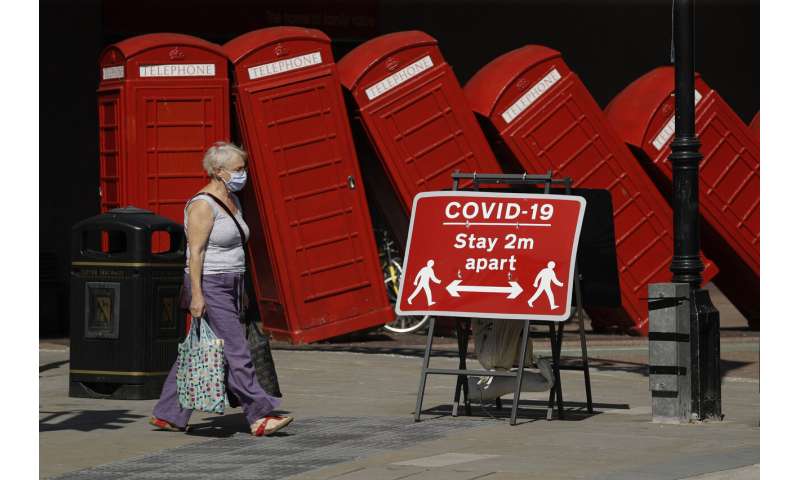
In this Monday, June 22, 2020 file photo, a sign requests people to stay two meters apart to reduce the spread of COVID-19 is displayed in front of "Out of Order" a 1989 red phone box sculpture by British artist David Mach, in London. So far in the vaccine race UK vaccination stats have a rate of 15 percent compared to some 3 percent in the EU bloc. The EU has already lost some 480,000 citizens to the pandemic in a bloc of 450 million with more fatalities mounting by the day. (AP Photo/Matt Dunham, File) -
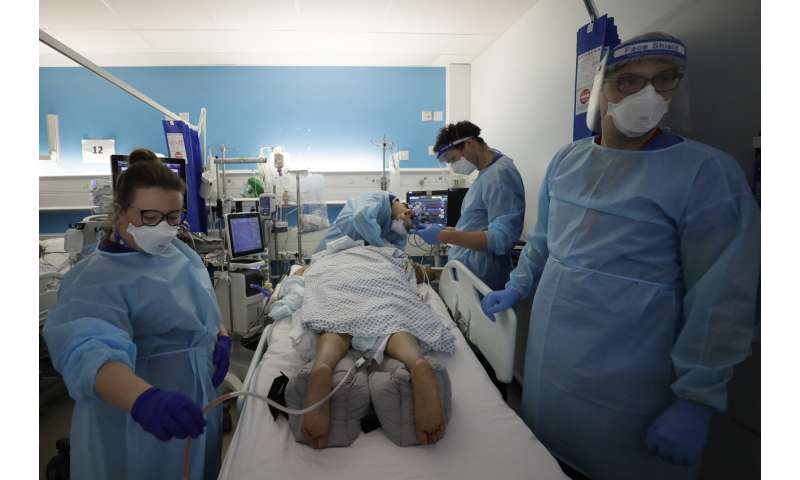
In this Wednesday, Jan. 27, 2021 file photo, Critical Care staff look after a COVID-19 patient on the Christine Brown ward at King's College Hospital in London. The scale of Britain's coronavirus outbreak can seem overwhelming, with tens of thousands of new infections and more than 1,000 deaths added each day. But on hospitals' COVID-19 wards, the pandemic feels both epic and intimate, as staff fight the virus one patient at a time, and with no end in sight. (AP Photo/Kirsty Wigglesworth, Pool, File) -
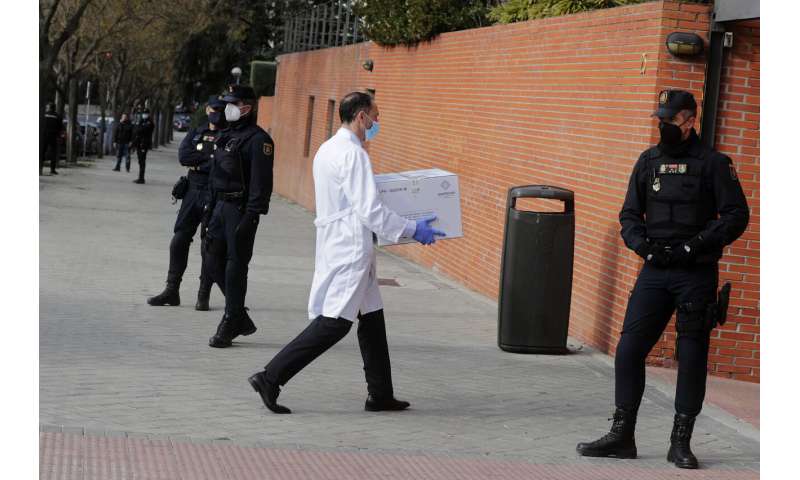
In this Sunday, Dec. 27, 2020 file photo, Police stand by the entrance of a nursing home as a box of some of the first Pfizer coronavirus vaccines arrives in Madrid, Spain. Spain plans to receive over 4.5 million doses of the vaccine over the next three months, enough it says to immunize just over 2.2 million people. The government estimates that this first phase will be enough to cover nursing home residents and workers, followed by health workers in general and people with disabilities. (AP Photo/Paul White, File) -
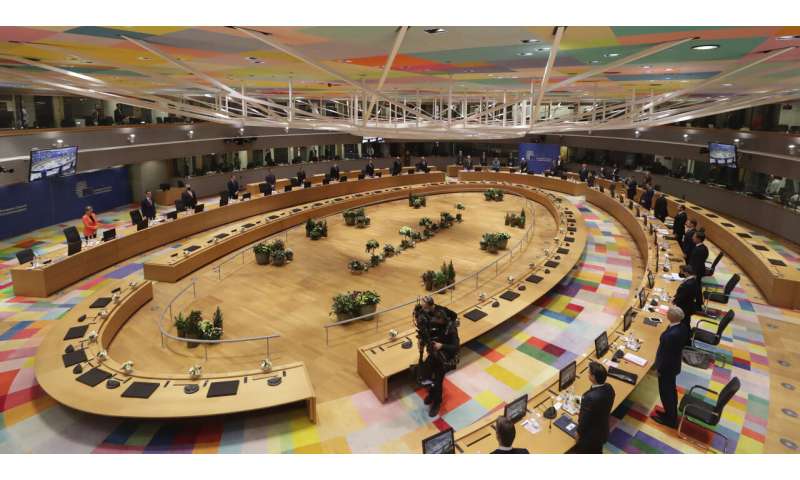
In this Thursday, Dec. 10, 2020 file photo, European Union leaders stand during a round table meeting at an EU summit in Brussels. As soon as it dawned on the continent more than one year ago that the virus would turn into the worst pandemic in a century, the race for a vaccine was on. In securing one, once it was available, the EU could not be as nimble as such a crisis situation demanded. The EU nations got competitive prices, but it took valuable time. (AP Photo/Olivier Hoslet, Pool, File) -
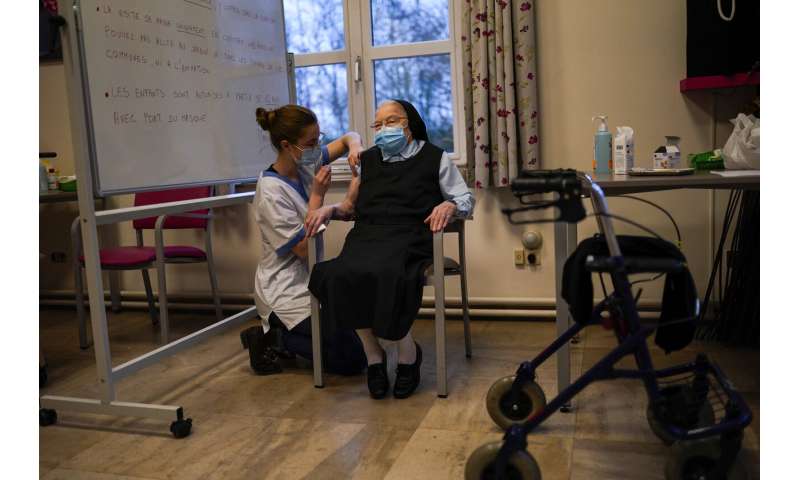
In this Thursday, Jan. 7, 2021 file photo, a nurse administers the Pfizer/Biontech COVID-19 vaccine to a nun at the CHC Landenne care home in Landenne-sur-Meuse, Belgium. Vaccination programs in the 27 nation-bloc have gotten off to a slow start and some EU members have been quick to blame the EU's executive arm for a perceived failure of delivering the right amount of doses. (AP Photo/Francisco Seco, File) -
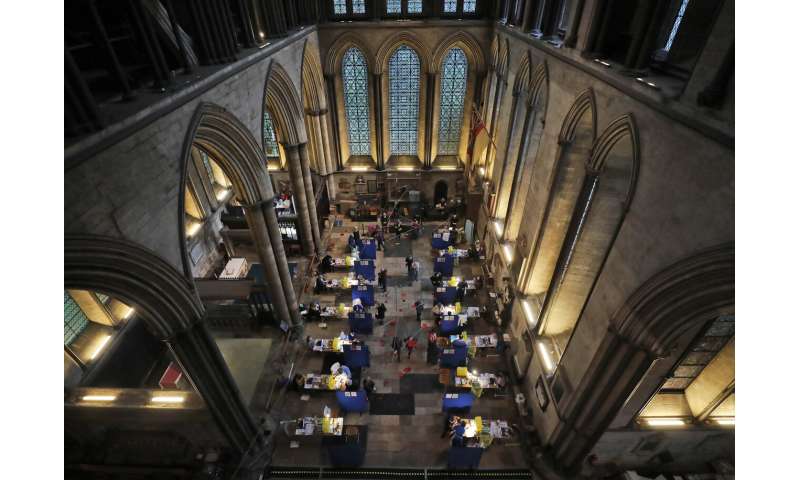
In this Wednesday, Jan. 20, 2021 file photo, tables are set up to provide people with the Pfizer-BioNTech vaccine inside Salisbury Cathedral in Salisbury, England. So far in the vaccine race UK vaccination stats have a rate of 15 percent compared to some 3 percent in the EU bloc. The EU has already lost some 480,000 citizens to the pandemic in a bloc of 450 million with more fatalities mounting by the day. (AP Photo/Frank Augstein, File) -
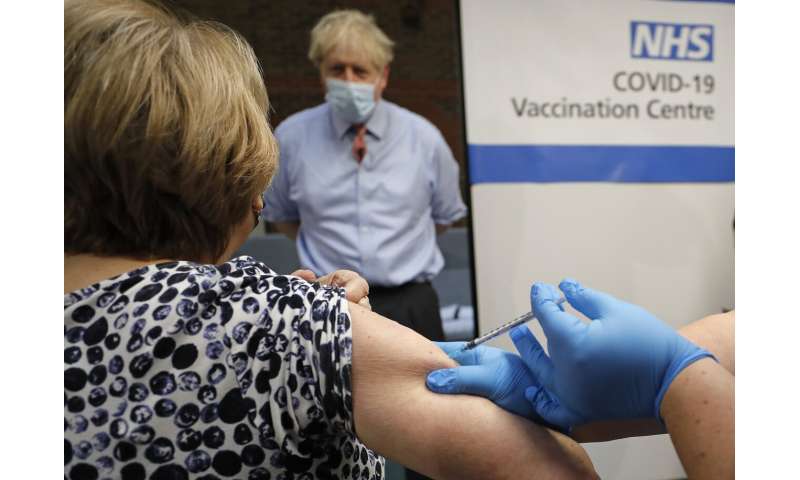
In this Tuesday, Dec. 8, 2020 file photo, British Prime Minister Boris Johnson watches as nurse Rebecca Cathersides administers the Pfizer-BioNTech COVID-19 vaccine to Lyn Wheeler at Guy's Hospital in London. Britain is racing to vaccinate more than 15 million people by mid-February, and in an effort to ensure vaccines get to the right places at the right times, along with the syringes, alcohol swabs and protective equipment needed to administer them, the government has called in the army. (AP Photo/Frank Augstein, Pool, File) -
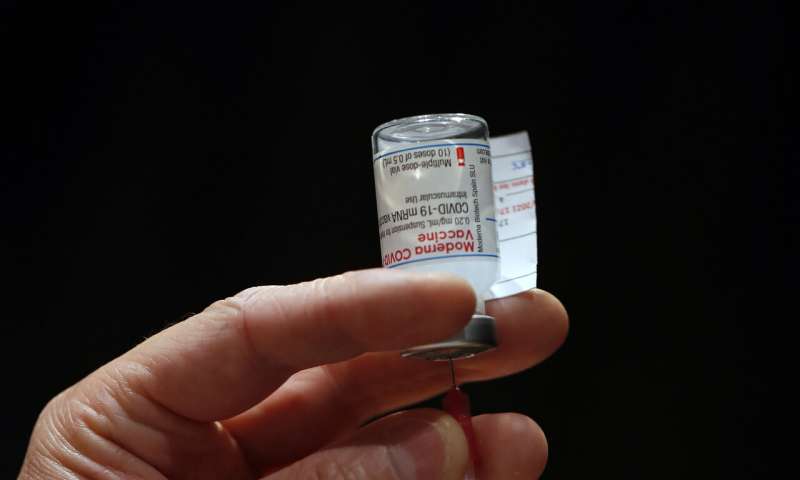
In this Thursday, Jan. 28, 2021 file photo, a member of the medical staff prepares a syringe with the Moderna COVID-19 vaccine at a vaccination center in Schiltigheim, eastern France. As soon as it dawned on the continent more than one year ago that the virus would turn into the worst pandemic in a century, the race for a vaccine was on. In securing one, once it was available, the EU could not be as nimble as such a crisis situation demanded. The EU nations got competitive prices, but it took valuable time. (AP Photo/Jean-Francois Badias, File) -
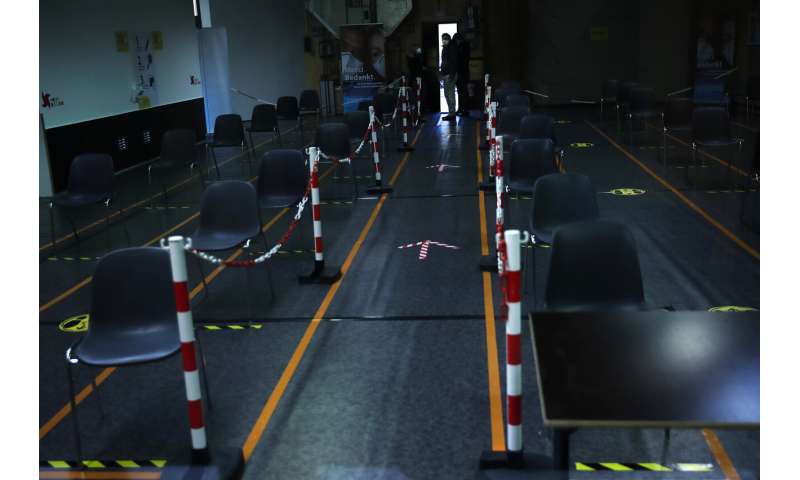
In this Wednesday, Feb. 3, 2021 file photo, people wear protective face masks, to prevent the spread of the coronavirus, as they stand in a newly set up COVID-19 vaccination center in the Molenbeek neighborhood in Brussels. Belgium is in the process of building and opening sites in strategic areas of the country to be prepared to move into a second phase of vaccinations which is dependent on when they receive their vaccine orders. (AP Photo/Francisco Seco, File )
Germany, France and Sweden decided to hold off on giving the AstraZeneca vaccine to those 65 and over. Belgium went further, restricting use to those under 55, even if it means carefully laid vaccination plans will have to be changed.
The EU's deliberate approach, however, may have prevented other problems. Without a joint strategy, smaller and poorer EU nations could have struggled to secure and pay for vaccines. With open borders, diverging national approaches could have led to chaos.
Despite the slow start, von der Leyen's pledge to have 70% of the bloc's adults vaccinated by the end of summer stands.
For now, it leaves Catherine Moureaux, mayor of Brussels' Molenbeek municipality, overseeing an empty vaccination center. But she's not complaining.
"We should not regret the fact that Europe is playing cautious," Moureaux said. "I actually think this is a good thing."
© 2021 The Associated Press. All rights reserved. This material may not be published, broadcast, rewritten or redistributed without permission.




















